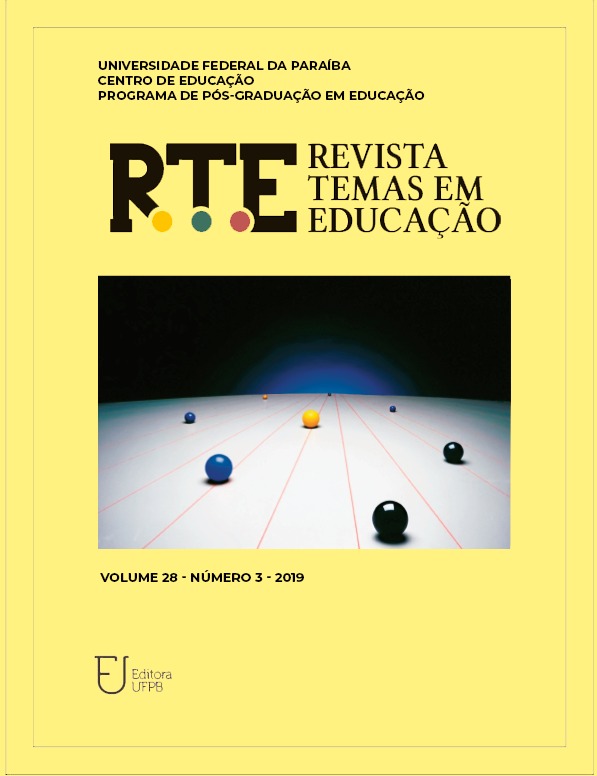DIGITAL AGE EDUCATION: STUDENTS UNDERSTANDING THE IMPORTANCE OF ICTs IN THE TEACHING LEARNING PROCESS
DIGITAL AGE EDUCATION: STUDENTS UNDERSTANDING THE IMPORTANCE OF ICTs IN THE TEACHING LEARNING PROCESS
DOI:
https://doi.org/10.22478/ufpb.2359-7003.2019v28n3.47791Keywords:
Digital Information and Communication Technologies, Night High School, Teaching-learning processAbstract
The study aims to gather information on the profile, use, accessibility and understanding of students about the importance of Digital Information and Communication Technologies (DICTs) in the teaching-learning process. The research was conducted in three state schools located in Fortaleza, with 159 students from 1st to 3rd night high school, using a questionnaire with 8 objective questions. After analysis, it was found that technological resources and their embedded technologies, despite the great progress achieved in recent years, are distant and inaccessible to the less favored social strata. Noting the growth of mobile technologies and the internet and, concomitantly, the invasion of this new digital culture in the school environment, we suggest that school institutions need to develop teaching proposals based on the appropriation of these technologies, through teaching that values new forms of learning. communication, production and sharing of knowledge, including the students in this teaching-learning process, as beings capable of producing knowledge.
Downloads
References
BAIRRAL, M. et al. Mãos em ação em dispositivos touchscreen na educação matemática. 1. ed. Rio de Janeiro: editora da UFRRJ, 2015.
BAUMAN, Z. Tempos líquidos. Rio de Janeiro: Jorge Zahar, 2007.
BAUMAN, Z. Sobre educação e juventude. Rio de Janeiro: Jorge Zahar, 2013.
CARDON, D. A inovação pelo uso. In: Desafios de Palavras: Enfoques Multiculturais sobre as Sociedades da Informação. França: C & F Éditions, 2005. Disponível em: <https://vecam.org/archives/article591.html>. Acessado em: 10 de ago. 2019.
COMITÊ GESTOR DA INTERNET NO BRASIL (CGI.br). Acesso às Tecnologias da Informação e da Comunicação (TIC). 2017. Disponível em <https://cetic.br/pesquisa/domicilios/indicadores>. Acessado em: 05 de ago. 2019.
FORQUIN, J. C. Escola e cultura: as bases sociais e epistemológicas do conhecimento escolar. Porto Alegre: Artes Médicas, 1993.
WEARESOCIAL. Global Digital Report. 2018. Disponível em <https://digitalreport.wearesocial.com/>. Acessado em: 05 de ago. 2019.
INSTITUTO BRASILEIRO DE GEOGRAFIA E ESTATÍSTICA (IBGE). Pesquisa Nacional por Amostra de Domicílios Contínua – PNAD. Rio de Janeiro: Diretoria de Pesquisas, 2017.
LATOUR, B. Ciência em ação: como seguir cientistas e engenheiros sociedade afora. São Paulo: Editora Unesp, 2000.
MORAES, M. C. Subsídios para Fundamentação do Programa Nacional de Informática na Educação. Secretaria de Educação à Distância, Ministério de Educação e Cultura, Jan/1997.
MORAN, J. M. Como utilizar a Internet na educação. Ciência da Informação, Brasília, v. 26, n. 2, 1997.
NOVAIS, A. E. Experiências genuinamente digitais e a herança do impresso: o que ajuda na interação com as interfaces gráficas. In: Linguagem, tecnologia e educação. São Paulo: Peirópolis, 2010.
PEREIRA, B. T.; FREITAS, M. C. D. O uso das tecnologias da informação e comunicação na prática pedagógica da escola. Curitiba: Secretaria da Educação, 2010. Disponível em: < http://www.diaadiaeducacao.pr.gov.br/portals/pde/arquivos/1381-8.pdf>. Acessado em: 05 de ago. 2019.
PETITAT, A. Produção da escola / produção da sociedade. Porto Alegre: Artes Médicas, 1994.
PRENSKY, M. Digital natives, digital immigrants. MCB University Press, v. 9, n. 5, 2001. Disponível em: < https://www.marcprensky.com/writing/Prensky%20-%20Digital%20Natives,%20Digital%20Immigrants%20-%20Part1.pdf>. Acessado em: 07 de ago. 2019.
RIBEIRO, A. E. et al. Linguagens, tecnologia e educação. São Paulo: Peirópolis, 2010.
TAJRA, S. F. Informática na educação: professor na atualidade. São Paulo: Érica, 1998.
TAVARES, T. A. et al. A TV digital interativa como ferramenta de apoio à educação infantil. Revista Brasileira de Informática na Educação, v. 15, n. 2, 2007.
Downloads
Published
How to Cite
Issue
Section
License
Authors who publish in this journal agree to the following terms:
. Authors retain the copyright and grant the journal the right to first publication, with the work simultaneously licensed under the Licença Creative Commons Attribution that allows the sharing of the work with acknowledgment of authorship and initial publication in this magazine. . Authors are authorized to assume additional contracts separately, for non-exclusive distribution of the version of the work published in this journal (eg, publishing in institutional repository or as a book chapter), with acknowledgment of authorship and initial publication in this journal.
. Authors are permitted and encouraged to publish and distribute their work online (eg in institutional repositories or on their personal page) at any point before or during the editorial process, as this can generate productive changes, as well as increase impact and citation of the published work (See O Efeito do Acesso Livre).



















